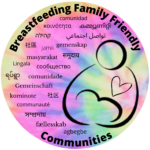By Samantha Sallee, MPH Candidate
UNC Gillings School of Global Public Health
Field Placement with Breastfeed Durham, Summer 2025
Creating spaces that support breastfeeding families is about more than comfort—it’s about health, equity, and community well-being. That’s why I developed the Breastfeeding-Friendly Policy Toolkit, a resource to help businesses, childcare centers, and clinics adopt supportive policies and earn recognition for their efforts as breastfeeding-friendly locations.
The Benefits of Lactation-Friendly Policies
- Health: Policies that support breastfeeding extend duration, improving both maternal and infant health outcomes.
- Legal: They ensure compliance with North Carolina workplace lactation law and federal requirements.
- Workplace: They increase employee satisfaction, retention, and productivity.
Why Policy Matters
When policies are missing, the impact on families can be serious. One North Carolina teacher shared:
“On top of being physically uncomfortable to even painful, it was very emotionally challenging as well… There were times where my pumping sessions were interrupted due to a student needing to get their belongings from my classroom (I had to pump in my classroom with the door locked because there was nowhere else to go). Ultimately, I ended up stopping around 6 months (as opposed to my goal of 1 year) because I just couldn’t continue experiencing all that anymore.”
A Practical Toolkit for Communities
This toolkit provides:
- Assessment guidance: How to identify workplace decision-makers, review current practices, and find space for lactation.
- Templates: Sample policies for employers and clinics that can be customized.
- Outreach resources: Email templates, bilingual flyers, and info cards.
- Recognition pathways: Step-by-step instructions for applying for the NC Breastfeeding Coalition’s Employer Award or the state’s Breastfeeding-Friendly Child Care designation.
By sharing lessons learned from outreach—including the importance of bilingual materials and timely follow-up—the toolkit offers a roadmap any community can adapt.
Read more about the toolkit here:
